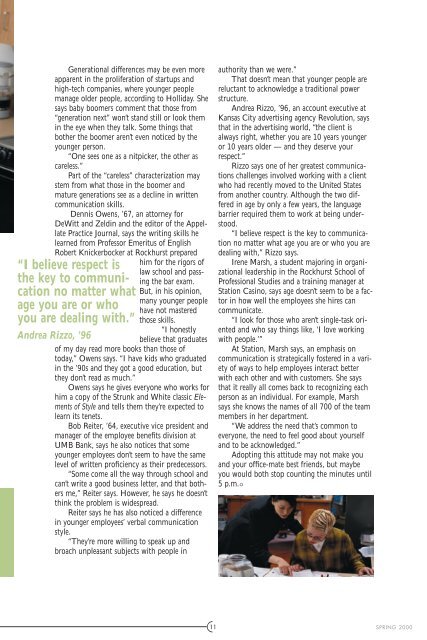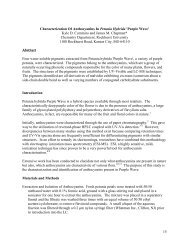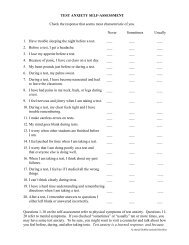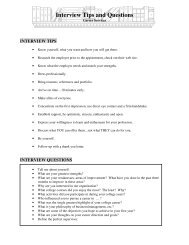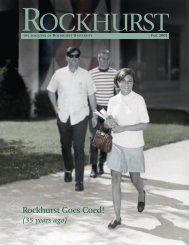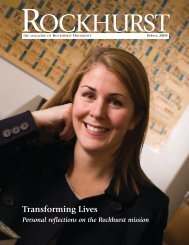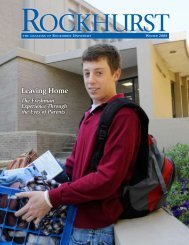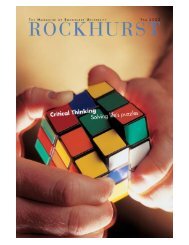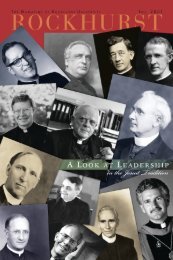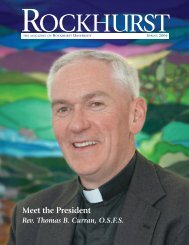Being Human - Rockhurst University
Being Human - Rockhurst University
Being Human - Rockhurst University
- No tags were found...
You also want an ePaper? Increase the reach of your titles
YUMPU automatically turns print PDFs into web optimized ePapers that Google loves.
Generational differences may be even moreapparent in the proliferation of startups andhigh-tech companies, where younger peoplemanage older people, according to Holliday. Shesays baby boomers comment that those from“generation next” won’t stand still or look themin the eye when they talk. Some things thatbother the boomer aren’t even noticed by theyounger person.“One sees one as a nitpicker, the other ascareless.”Part of the “careless” characterization maystem from what those in the boomer andmature generations see as a decline in writtencommunication skills.Dennis Owens, ’67, an attorney forDeWitt and Zeldin and the editor of the AppellatePractice Journal, says the writing skills helearned from Professor Emeritus of EnglishRobert Knickerbocker at <strong>Rockhurst</strong> prepared“I believe respect isthe key to communicationno matter whatage you are or whoyou are dealing with.”him for the rigors oflaw school and passingthe bar exam.But, in his opinion,many younger peoplehave not masteredthose skills.“I honestlybelieve that graduatesof my day read more books than those oftoday,” Owens says. “I have kids who graduatedin the ’90s and they got a good education, butthey don’t read as much.”Owens says he gives everyone who works forhim a copy of the Strunk and White classic Elementsof Style and tells them they’re expected tolearn its tenets.Bob Reiter, ’64, executive vice president andmanager of the employee benefits division atUMB Bank, says he also notices that someyounger employees don’t seem to have the samelevel of written proficiency as their predecessors.“Some come all the way through school andcan’t write a good business letter, and that bothersme,” Reiter says. However, he says he doesn’tthink the problem is widespread.Reiter says he has also noticed a differencein younger employees’ verbal communicationstyle.“They’re more willing to speak up andbroach unpleasant subjects with people inAndrea Rizzo, ’96authority than we were.”That doesn’t mean that younger people arereluctant to acknowledge a traditional powerstructure.Andrea Rizzo, ’96, an account executive atKansas City advertising agency Revolution, saysthat in the advertising world, “the client isalways right, whether you are 10 years youngeror 10 years older — and they deserve yourrespect.”Rizzo says one of her greatest communicationschallenges involved working with a clientwho had recently moved to the United Statesfrom another country. Although the two differedin age by only a few years, the languagebarrier required them to work at being understood.“I believe respect is the key to communicationno matter what age you are or who you aredealing with,” Rizzo says.Irene Marsh, a student majoring in organizationalleadership in the <strong>Rockhurst</strong> School ofProfessional Studies and a training manager atStation Casino, says age doesn’t seem to be a factorin how well the employees she hires cancommunicate.“I look for those who aren’t single-task orientedand who say things like, ‘I love workingwith people.’”At Station, Marsh says, an emphasis oncommunication is strategically fostered in a varietyof ways to help employees interact betterwith each other and with customers. She saysthat it really all comes back to recognizing eachperson as an individual. For example, Marshsays she knows the names of all 700 of the teammembers in her department.“We address the need that’s common toeveryone, the need to feel good about yourselfand to be acknowledged.”Adopting this attitude may not make youand your office-mate best friends, but maybeyou would both stop counting the minutes until5 p.m.11 SPRING 2000


